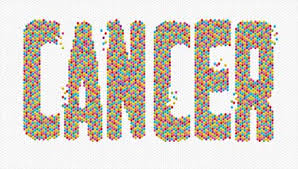Cancer
Cancer refers to any one of a large number of diseases characterized by the development of abnormal cells that divide uncontrollably and have the ability to infiltrate and destroy normal body tissue. Cancer often has the ability to spread throughout your body.
Causes
Cancer is caused by changes (mutations) to the DNA within cells. The DNA inside a cell is packaged into a large number of individual genes, each of which contains a set of instructions telling the cell what functions to perform, as well as how to grow and divide. Errors in the instructions can cause the cell to stop its normal function and may allow a cell to become cancerous.
What do gene mutations do?
A gene mutation can instruct a healthy cell to:
- Allow rapid growth.A gene mutation can tell a cell to grow and divide more rapidly. This creates many new cells that all have that same mutation.
- Fail to stop uncontrolled cell growth.Normal cells know when to stop growing so that you have just the right number of each type of cell. Cancer cells lose the controls (tumor suppressor genes) that tell them when to stop growing. A mutation in a tumor suppressor gene allows cancer cells to continue growing and accumulating.
- Make mistakes when repairing DNA errors.DNA repair genes look for errors in a cell’s DNA and make corrections. A mutation in a DNA repair gene may mean that other errors aren’t corrected, leading cells to become cancerous.
These mutations are the most common ones found in cancer. But many other gene mutations can contribute to causing cancer.
What causes gene mutations?
Gene mutations can occur for several reasons, for instance:
- Gene mutations you’re born with.You may be born with a genetic mutation that you inherited from your parents. This type of mutation accounts for a small percentage of cancers.
- Gene mutations that occur after birth.Most gene mutations occur after you’re born and aren’t inherited. A number of forces can cause gene mutations, such as smoking, radiation, viruses, cancer-causing chemicals (carcinogens), obesity, hormones, chronic inflammation and a lack of exercise.
Gene mutations occur frequently during normal cell growth. However, cells contain a mechanism that recognizes when a mistake occurs and repairs the mistake. Occasionally, a mistake is missed. This could cause a cell to become cancerous.
How do gene mutations interact with each other?
The gene mutations you’re born with and those that you acquire throughout your life work together to cause cancer.
For instance, if you’ve inherited a genetic mutation that predisposes you to cancer, that doesn’t mean you’re certain to get cancer. Instead, you may need one or more other gene mutations to cause cancer. Your inherited gene mutation could make you more likely than other people to develop cancer when exposed to a certain cancer-causing substance.
It’s not clear just how many mutations must accumulate for cancer to form. It’s likely that this varies among cancer types.
Symptoms
Signs and symptoms caused by cancer will vary depending on what part of the body is affected.
Some general signs and symptoms associated with, but not specific to, cancer, include:
- Weakness
- Tumour or lump
- Weight loss
- Nausea / Vomiting
- Loss of Appetite
- cough / difficult breathing
- Difficulty in swallowing
- Hoarseness
- Abdomen pains after eating
- Joint pains
- Fever
- Bleeding
Risk factors
While doctors have an idea of what may increase your risk of cancer, the majority of cancers occur in people who don’t have any known risk factors. Factors known to increase your risk of cancer include:
Your age
Cancer can take decades to develop. That’s why most people diagnosed with cancer are 65 or older. While it’s more common in older adults, cancer isn’t exclusively an adult disease — cancer can be diagnosed at any age.

